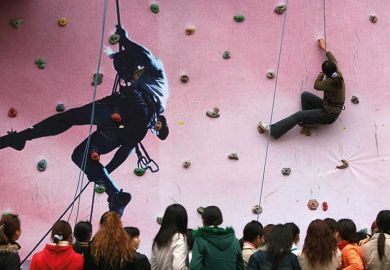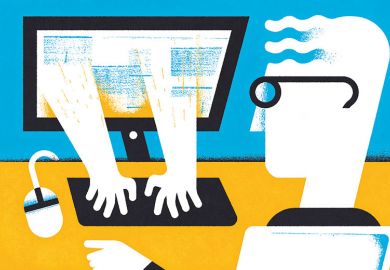Getting someone else to write an essay is clearly cheating, but what if a student has another person proofread their work? Pointing out a missed comma seems fairly innocent, but what if the proofreader rewrote whole sentences or even paragraphs? And what if the student had paid them to do so?
Who is permitted to proofread and revise an essay is a tricky subject, one made even more so since the proliferation of proofreading services that charge for their work available over the internet.
In 2011, the scandal over alleged plagiarism by and excessive assistance given to Saif al-Islam Gaddafi during his doctoral studies at the London School of Economics thrust the issue into the spotlight in the UK.
Since then, many universities in the country have developed guidelines on the subject. However, experts now warn that a lack of uniformity across the sector risks unfairly penalising students or creating loopholes that allow cheaters to escape sanction. Guidelines vary by institution, but all insist that a student must unambiguously be the author of work they present as their own.
The University of Leeds’ policy says responsibility for proofreading work before submission rests with the individual student. Although students are permitted to “peer-review”, the reviewer may only comment on the work, not directly amend it.
The University of Reading encourages students to seek guidance from their school, but adds that any third-party editing must be acknowledged in a written statement. Coventry University’s regulations do not bar proofreaders, but do state that the use of one must “not compromise the authorship of the submitted work”.
Michael Draper, dean of regulations and student cases at Swansea University and director of the Swansea Academy for Inclusivity and Learner Success, said the issue has gone under the radar for some time.
“The key question is: at what point do changes made by a proofreader become so extensive that the work can no longer be fairly said to be that of the student, so as to impact on the assessment of learning outcomes?” he said.
Some assessments award marks for accurate spelling and grammar, so even proofreading to this extent can be a problem, although this is normally acceptable. Proofing code formulae and equations in science and mathematics subjects is a particular issue, Professor Draper said.
Thomas Lancaster, a senior teaching fellow at Imperial College London, said the use of proofreaders was “a grey area in higher education right now”, noting that the main concern in assessment was whether the tutor was marking the work of the student, not that of a third party.
“There are many legitimate proofreaders out there, but also a lot that are fronts for contract cheating services. The way they advertise, it’s hard for students to know the difference,” he said.
This is backed up by the Quality Assurance Agency’s guidelines on cheating, which warn that “such services can be a gateway to full-scale contract cheating”.
Allowing the use of these services also raised a question of fairness, said Professor Draper, because students who could afford to pay for such assistance would enjoy an advantage over those who could not. “Any policy must be made having regard to that context,” he said.
Adam Harvey, chief executive of Proofed, a proofreading business, said he supported – and was looking to develop – a uniform set of proofreading and editing guidelines across universities. This “will ensure that students don’t inadvertently plagiarise. It will also provide transparency in the academic process and allow proofreading companies to standardise their service according to an agreed-upon policy,” he said.
For Irene Glendinning, academic manager for student experience at Coventry, proofreading is “a legitimate stage in the process of writing. It is difficult for an author to objectively proofread their own work, for many reasons.
“I was surprised to hear that proofreading is not allowed in some HEIs. This seems to be a very excessive response to what should be a manageable issue,” she said.
“Employing someone else – paid or otherwise – to help find the typos and point out areas that need attention is nothing to do with plagiarism,” she said. “The proofreader needs to be constrained by the guidelines in what they are permitted to change, and they need to be competent and proficient, ideally trained and professional in their approach, with some endorsement or certification.”
Guidelines should specify that if assessed work is proofread, the student must keep copies of their originals to demonstrate exactly what changes have been made by the proofreader, said Dr Glendinning, to counter any fears of unfair assistance.
Dr Lancaster agreed. “The student should have a copy of their work before and after proofreading and should acknowledge the use of a proofreader on their submission,” he said. “If there are any factual changes or the argument the student has put forward has been rewritten, the proofreader has gone too far.”
POSTSCRIPT:
Print headline: Just another pair of eyes, or a means to plagiarise?
Register to continue
Why register?
- Registration is free and only takes a moment
- Once registered, you can read 3 articles a month
- Sign up for our newsletter
Subscribe
Or subscribe for unlimited access to:
- Unlimited access to news, views, insights & reviews
- Digital editions
- Digital access to THE’s university and college rankings analysis
Already registered or a current subscriber?




